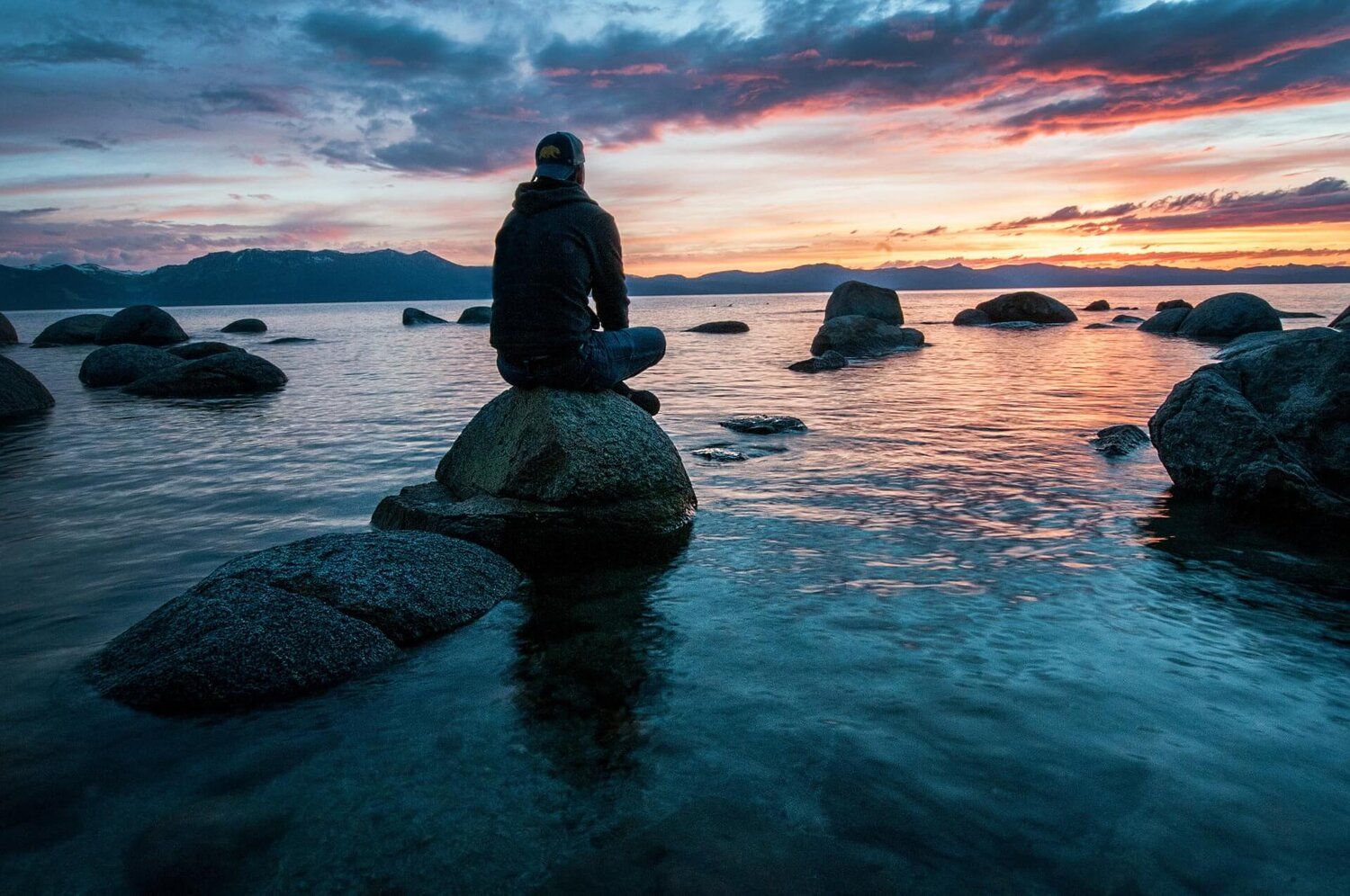Alone but not Lonely: A Solitude Toolbox
Apr 20
/
Savoy Stevens

In a culture that rewards extroversion, being alone is often viewed negatively. For logical reasons, humans are wired for connection and loneliness is a debilitating reality of modern life with far-reaching implications. Current research shows loneliness is a distressing epidemic with devastating effects on mental, physical, and emotional health.[1] In a crisis, such as the current global pandemic where we are thrown into exile from each other, our nervous systems are thrown into chaos. It increases our likelihood of experiencing loneliness, anxiety, and depression. Yet it is possible to be alone and not lonely.
While loneliness is unhealthy, solitude is healing and nourishes the soul, reconnecting us with our sense of self and of God. Each of us has a different appetite for solitude - some of us are more comfortable spending time alone than others. In this unusual season, most of us are experiencing some form of social isolation as we collectively fight to stem the tide of COVID-19.[2] As we are forced into varying degrees of aloneness, our experiences vary from person to person, and from day to day. Some found being alone easy at first but became draining and discouraging after too many days. Others were surprised by the new rhythms they have found, despite the emotions and struggles that isolation brought.
Everything we once knew has changed, shifting our identity and our sense of self. Our brains created maps to tell us how to do life and we operate according to those maps every day. A crisis, or a significant change, forces our brain to create a new map. Changes register in our brain as an “error” and when that happens, our nervous system amps up. As we adapt to being alone, or being with the same small group of people every day, everything is registering as an error. Our nervous system is feeling the effects - increasing our experience of loneliness, anxiety, and depression.
Thankfully, our nervous system is adaptable. Fighting a global pandemic through isolation is counterintuitive for many of us, and has changed our sense of connectedness to God, the Earth, and people. In stress, our brain’s hormones create catastrophic brain impulses that flash worse case scenarios across our mind’s eye. This crisis has unnerved us by destroying our ability to connect in the ways that we are accustomed to but being intentional about connecting resets our nervous systems. So, does creating structure and routines. Monastic life lends a helpful example of how creating schedules for the day, week, and month brings soothing order to our days. Get above it by becoming aware of these thoughts, and by recognizing their origin as a stress response. Being alone takes getting used to. We can help ourselves to take steps to reset our circuitry by shifting loneliness to solitude.
FIVE TOOLS FOR ENGAGING SOLITUDE [3]
Lament - Recognize your grief. Being alone hurts and we do everything not to feel the pain. The only way to get through grief is to feel it. The Psalms are a vehicle of lament for the Christian life. Praying the Psalms reassures us faith and sadness can coexist.
Hospitality - The root of the word “hospitality,” hospes, means both host and guest. Care for yourself by attending to the classic elements of hospitality as you would attend to a guest; fold your laundry with intention and care, have a drink of your choice in a fancy glass, light a candle as a companion in your space.
Generosity - Care for others by showing up for someone in a new way. Send them a book, a note, money to their Venmo account, or have a meal delivered. Tell them why you love them and why you are grateful for them.
Quality over Quantity - Make your connections mean something. Go deeper. Ask the bigger questions. Be more vulnerable yourself. It will mean more and sustain you longer.
Ritual - Find practices that remind you who you are and whose you are. A daily morning liturgy, singing songs, creating, cooking, walking. Find a rhythm and a practice that serves you. What brings you life?
Christ spent time alone. The saints and mystics of Christian history sought spacious time in lonely places, which ultimately forged their deep interior life. Henri Nouwen referred to solitude as the “furnace of transformation,” alluding to the power of being alone to invoke change as it is a “place of great struggle, and great encounter.”[4] Solitude can be a source of energy and rejuvenation where we discover new things about ourselves and about God. Human connection and our sense of connectedness - to each other, to the Earth, and to God, is integral to our spiritual and physical well-being, and when loneliness is an outcome of social isolation the effects are devastating. However, it is possible to be alone, but not lonely. May you find comfort, connection, and wonder in this spacious season.
Notes:
[1] Loneliness is now considered one of the primary contributors to the deterioration of emotional health, and a significant risk factor for physical health. Research suggests that those who are isolated are at an increased risk of a wide range of health problems, including increased risk of heart attacks, stroke, and cancer. Lonely people are more likely to suffer from insomnia, depression, and rapid cognitive decline in old age.
[2] Healthcare workers, food supply chain workers, first responders, and other essential workers are experiencing the opposite of solitude as they fulfill their duties to support life. I would like to recognize this and express my gratitude for the invaluable contribution they are putting forth during this unprecedented time.
[3] Many thanks to my friend Keller Hawkins, Chaplain Resident at Westminster College in Fulton, MO, for her inspiration and contribution to this list.
[4] For more on the solitary life of the Desert Fathers and Mothers, see Henri Nouwen’s book The Way of the Heart. 1st Ballantine Trade Pbk. ed. New York: Ballantine Books, 2003.

Savoy Stevens
Savoy Stevens, M.Div. is a spiritual director and minister in the Bay Area. She holds a Master’s of Divinity, with a concentration in Spiritual Formation from Portland Seminary and was trained, supervised, and certified as a spiritual director through George Fox University. Her postgraduate coursework includes Interfaith Studies at the University of Wales, Trinity Saint David. Savoy practices spiritual direction from an ecumenical, non-denominational perspective, welcoming directees from all faith traditions. She approaches direction sessions with curiosity and acceptance, listening deeply for the resonance of the Divine in the grit of everyday life. She asks questions and offers her undivided attention as a reflective tool for increasing your sense of the Divine. She considers spiritual direction a radical act of resistance in a culture consumed with certainty, overexposure, and noise.
Savoy Stevens, M.Div. is a spiritual director and minister in the Bay Area. She holds a Master’s of Divinity, with a concentration in Spiritual Formation from Portland Seminary and was trained, supervised, and certified as a spiritual director through George Fox University. Her postgraduate coursework includes Interfaith Studies at the University of Wales, Trinity Saint David. Savoy practices spiritual direction from an ecumenical, non-denominational perspective, welcoming directees from all faith traditions. She approaches direction sessions with curiosity and acceptance, listening deeply for the resonance of the Divine in the grit of everyday life. She asks questions and offers her undivided attention as a reflective tool for increasing your sense of the Divine. She considers spiritual direction a radical act of resistance in a culture consumed with certainty, overexposure, and noise.

